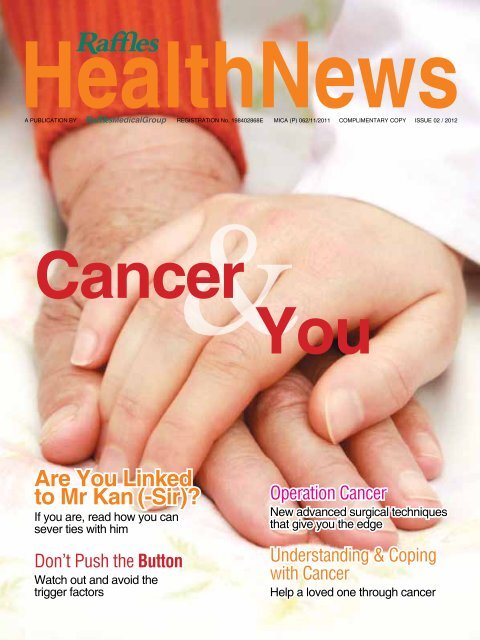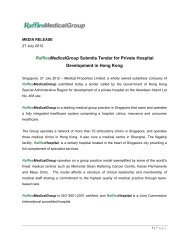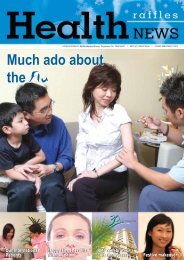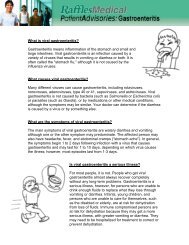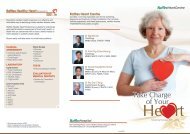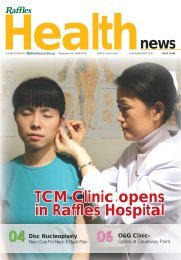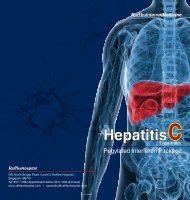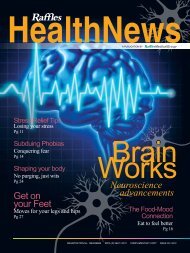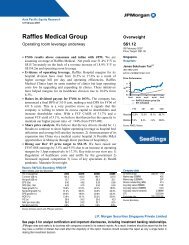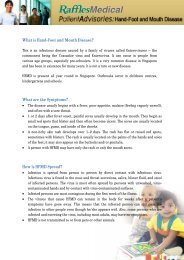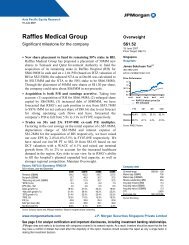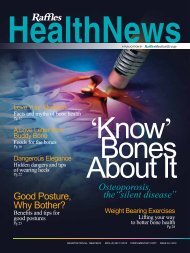Cancer You - Raffles Medical Group
Cancer You - Raffles Medical Group
Cancer You - Raffles Medical Group
You also want an ePaper? Increase the reach of your titles
YUMPU automatically turns print PDFs into web optimized ePapers that Google loves.
A PUBLICATION BY REGISTRATION No. 198402868E MICA (P) 062/11/2011 COMPLIMENTARY COPY ISSUE 02 / 2012<strong>Cancer</strong><strong>You</strong>Are <strong>You</strong> Linkedto Mr Kan (-Sir)?If you are, read how you cansever ties with himDon’t Push the ButtonWatch out and avoid thetrigger factorsOperation <strong>Cancer</strong>New advanced surgical techniquesthat give you the edgeUnderstanding & Copingwith <strong>Cancer</strong>Help a loved one through cancer
Leading the fightagainst cancerAt <strong>Raffles</strong> <strong>Cancer</strong> Centre, we believe in caring for our patients through clinicalexcellence and our commitment to stay engaged with the latest advancementsin cancer research. Our team of medical oncologists and haematologists offerthe subspecialty advantage in the various forms of cancer treatment.As we are part of a group practice in <strong>Raffles</strong> Hospital, all our patients willhave access to the best skills of our fellow healthcare professionals includingsurgeons, radiologists, pathologists, specialised nursing staff, dietitians andtherapists, to deliver the most effective holistic treatment.Meet Our Team<strong>Medical</strong> OncologyDr Donald Poon Yew HeeGeneral oncology, colorectal cancer, liver cancer, oesophageal cancer,stomach cancer, pancreatic cancer, bile duct cancer, sarcoma – bone andsoft tissue cancers, neuroendocrine tumours, melanoma and geriatriconcology (cancers in the elderly)Dr Toh Chee KeongGeneral oncology, brain tumours, head and neck oncology – nasopharyngealcancer (NPC), oral and throat cancers, lung cancers, thymic tumours,genitourinary oncology (kidney, bladder and prostate cancers) and melanomaDr Lynette Ngo Su-MienGeneral oncology, breast cancer and gynaecologic cancers (ovarian, uterine,cervical cancers), cancer screening and familial genetics, psychosocialoncology and palliative medicineHaematologyDr Tan Chen Lung DarylGeneral haematology, acute lymphoid / myelocytic leukaemias (ALL/AML),chronic lymphocytic / myeloid leukaemia (CLL/CML), high grade and lowgrade lymphoma, multiple myeloma, and myelodysplastic syndromes (MDS)HospitalServices <strong>Cancer</strong> Genetic Testing Diagnostic Services <strong>Cancer</strong> Treatment• Chemotherapy• Hormone Therapy• Biological Therapy• Minimally Invasive TumourAblation Treatment• SIR-Spheres Targeted Molecular Therapy Second opinion medicalrecord review at MSKCC <strong>Cancer</strong> Surgery Supportive Services• Nutritional Counselling• Oncology Pharmacy• Pain Management• Psychological Support• Nutritional Support PackageContact us to understand more about the services available at <strong>Raffles</strong> <strong>Cancer</strong> Centre.RAFFLES CANCER CENTREAffiliated with Memorial Sloan Kettering <strong>Cancer</strong> Center585 North Bridge Road | Level 13, <strong>Raffles</strong> HospitalTel: (65) 6311 2300 | Fax: (65) 6311 1181 | Email: specialist@raffleshospital.comOpening Hours:Monday - Friday: 8.30am - 6.00pmSaturday: 8.30am - 1.00pm
ContentsFoodnotes 27NewsRoom 4New Docs on the Block | <strong>Medical</strong> Clinics’ Relocation |<strong>Raffles</strong> <strong>You</strong>r Trusted Partner | Women’s Wellness RedefinedSupplements 28Ask a <strong>Raffles</strong> Doc 29Promotions 30Features<strong>Cancer</strong> and <strong>You</strong> 7 Operation <strong>Cancer</strong> 18<strong>Cancer</strong> is a growing health issue, affecting one in three people Be informed about how surgery could be your best weapontoday. Read on to know the symptoms that you just shouldn’t against cancer.ignore.Are you linked to Mr Kan (-Sir)? 9Thanks to medical advancements, we can now check if wepossess genes that increase our risk to cancer. Let our expertstell you how.Don’t Push the Button 12Read on for helpful advice from our panel of experts on waysthat you can avoid the trigger factors.UpClose 16Mdm Alice Koh, a Patient Service Officer at <strong>Raffles</strong> <strong>Cancer</strong>Centre shares how she delights patients with more than just apleasant smile.Understanding and Copingwith <strong>Cancer</strong> 22We give you ideas on how to go about caring and supporting aloved one through the battle against cancer.Silence <strong>Cancer</strong>, Speak Up 24Been there and done that. Here’s what some cancer survivorshave to say about their victorious battle.Herbal’s Measures for <strong>Cancer</strong>’sPressures 26Learn how Chinese herbs can help to reduce the side effects ofchemotherapy.DIRECTORYwww.rafflesmedicalgroup.comCorporate Accounts Enquiries 6311 1333Fax No. 6311 2383www.rafflesmedical.comGeneral Enquiries 6311 2222Fax No. 6311 2392• Anchorpoint 6479 3818• Ang Mo Kio 6453 2288• Anson Centre 6225 2188• Asia Square 6636 0160• Bedok North 6441 1736• Bishan 6456 7122• Capital Tower 6323 5212• Causeway Point* 6894 0777• Centrepoint* 6733 8775• Changi Business Park 6781 7337• Changi City Point 6636 1251• Clementi* 6872 9043• Compass Point* 6881 7337• Harbour Front 6273 3078• Hougang Central 6386 7896• Jurong East 6899 6688• I12 Katong 6636 3730• Lot 1 Shoppers’ Mall 6765 3363• Loyang Point 6585 3333• Mapletree Business City 6570 6970• Marina Square 6339 6644• Millenia Walk 6337 6000• Nex 6634 2585• Ngee Ann City* 6734 7355• Northpoint 6755 0049• One Marina Boulevard 6225 2776• One <strong>Raffles</strong> Place* 6535 2222• <strong>Raffles</strong> Airport <strong>Medical</strong> CentrePasssenger Terminal 2* 6543 1118Passsenger Terminal 3* 6241 8818Airport Transit 1 6543 1113Airport Transit 2 6543 1118Changi Cargo Complex 6543 1038• <strong>Raffles</strong> City 6339 6911• <strong>Raffles</strong> <strong>Medical</strong>@<strong>Raffles</strong> Hospital* 6311 2233• Robinson Point 6223 1188• Science Park I 6776 7155• Sembawang Way 6853 7703• Siglap Centre 6442 0488• Sixth Avenue 6462 3426• Tampines 1* 6260 5116• TechPlace II 6556 2318• Toa Payoh Central 6254 7667* Clinics near / with X-ray facilities<strong>Raffles</strong> <strong>Medical</strong> Hong KongCentral Li Dong (852) 3168 2102Taikoo Place (852) 2525 1730Hong Kong International Airport (852) 2261 2626<strong>Raffles</strong> <strong>Medical</strong> ShanghaiInnov Tower (86) 21 6197 2300www.raffleshospital.comGeneral Enquiries 6311 1111Call Centre Fax No. 6311 213624 Hour Emergency 6311 1555Admissions / Business Office 6311 1888<strong>Raffles</strong> International Patients Centre 6311 1666International Patients Centre Fax No. 6311 233324 Hour Appointments Hotline 6311 1222Fax No. 6311 2136Emailspecialist@raffleshospital.com<strong>Raffles</strong> Aesthetics<strong>Raffles</strong> <strong>Cancer</strong> Centre<strong>Raffles</strong> Children’s Centre<strong>Raffles</strong> Chinese Medicine<strong>Raffles</strong> Counselling Centre<strong>Raffles</strong> Dental<strong>Raffles</strong> Dialysis Centre<strong>Raffles</strong> ENT Centre<strong>Raffles</strong> Executive <strong>Medical</strong> Centre<strong>Raffles</strong> Eye Centre<strong>Raffles</strong> Fertility Centre<strong>Raffles</strong> HealthScreeners<strong>Raffles</strong> Heart Centre<strong>Raffles</strong> Internal Medicine Centre<strong>Raffles</strong> Japanese Clinic<strong>Raffles</strong> NeuroScience Centre<strong>Raffles</strong> Orthopaedic Centre<strong>Raffles</strong> Pain Management Centre<strong>Raffles</strong> Skin Centre<strong>Raffles</strong> Surgery Centre<strong>Raffles</strong> UroRenal Centre<strong>Raffles</strong> Women’s CentrePhysiotherapy CentreRadiologyRegional Representative Office<strong>Raffles</strong> International Office Jakarta 62 21 5785 3979Liaison Centres OfficesSolo 62 271 3020033Dhaka 88 0 2 8834976Phnom Penh 855 17 978 999Ho Chi Minh City 84 8 2220 2088Hanoi 84 4 2215 354484 4 3715 3826Vinh 84 38 3550 368Myanmar 95 1 299 944Editorial: Dr Prem Kumar Nair, Magdalene Lee,Joanna Lee, Edmond Loh &Jacquelyn TanCreative: Edd Chua, Jenny Cheok &Ho Yeong ShingThe information contained in this publicationshould not be regarded as a substitute for detailedmedical advice in individual cases.All rights reserved. No part of this publicationmay be reproduced in any form or by any meanswithout the written permission of the publisher.Please address all correspondence toThe Editor, <strong>Raffles</strong> HealthNews,Fax no. 6311 2378Email: healthnews@rafflesmedical.com<strong>Raffles</strong> HealthNews is published by<strong>Raffles</strong> <strong>Medical</strong> <strong>Group</strong> Ltd585 North Bridge Road, <strong>Raffles</strong> Hospital#11-00, Singapore 188770www.rafflesmedicalgroup.comPrinted by Xpoprint (Asia) Pte LtdMay 12
4 Newsroom <strong>Raffles</strong> HealthNewsNew Docs on the BlockDr Chu Hui PingSpecialist in Paediatrics and Consultant, <strong>Raffles</strong> Children’s CentrePrior to joining <strong>Raffles</strong> Hospital, Dr Chu Hui Ping had been practicing at KKH as a Consultant inPaediatric Medicine as well as a Specialist in Paediatric Gastroenterology, Hepatology and Nutritionservice. She manages general ambulatory paediatric conditions including childhood vaccinations,developmental assessment, and common paediatric illnesses.Dr Chu’s main areas of interests are recurrent abdominal pain, constipation, gastro-oesophageal refluxdisease, food allergies, inflammatory bowel disease and feeding issues. She is also experiencedin performing oesophago-gastro-duodenoscopy (OGD), colonoscopy as well as 24 hour pH andimpedance studies in children.Dr Seng Shay WaySpecialist in Obstetrics & Gynaecology and Consultant, <strong>Raffles</strong> Women’s CentreDr Seng Shay Way is a MOH-certified reproductive specialist with expertise and knowledge from over15 years of experience in teaching and in the treatment of reproductive disorders and infertility. He is alsoon the board of the welfare committee of the Sree Narayana Home for the Aged Sick and the Merantihome in Pelangi village. In addition, Dr Seng is a registered doctor in People’s Republic of China and hasbeen a visiting fertility consultant to the Shanghai United Family Hospital since 2009.Dr Seng is involved in post-graduate teaching at KKH. His main research interests are in PolycysticOvaries Syndrome (PCOS), recurrent miscarriages, the use of antagonists in IVF cycles, endometriosistreatments and surgery. He has undergone training in gynaecological surgery including abdominal,laparoscopy with emphasis on fertility treatment and preservation.Dr Tan Yu-MengSpecialist in General Surgery and Consultant, <strong>Raffles</strong> Surgery CentreDr Tan Yu-Meng has a keen interest in hepatobiliary-pancreatic / transplantation surgery and gastrointestinalsurgical oncology. He is one of few surgeons in Asia who carries out surgery for peritoneal malignancy. DrTan was a founding member of the liver transplantation team at the Singapore General Hospital (SGH) in2005. During this time, he performed the first Heart-Liver Transplantation successfully in Asia in 2009. Duringhis surgical training, he received several awards including the <strong>You</strong>ng Surgeons Award at the Asian SurgicalCongress.Among other appointments, Dr Tan was also Adjunct Assistant Professor at the Duke-NUS Graduate <strong>Medical</strong>School. He has published over 80 articles in surgical journals including the Annals of Surgery and British<strong>Medical</strong> Journal, and remains an active speaker at medical conferences and reviewer of multiple medicaljournals. In addition to his subspecialty interest, Dr Tan has a keen interest in general surgery and will providespecialist consultation for endoscopy, gallstones, hernias, thyroid and gastrointestinal surgical conditions.Dr David ChoySpecialist in Neurosurgery and Consultant, <strong>Raffles</strong> NeuroScience CentreDr David Choy has the expertise to manage a wide variety of neuro-oncologic and neurovascularpathologies. He also performs microsurgical cerebral revascularisation procedures for stroke patients.He has a keen interest in the use of advanced techniques of minimally invasive spine surgery in thetreatment of spine tumours, degenerative as well as trauma related spine problems.Dr Choy provides paediatric neurosurgical services and manages complex skull base pathologies. He is alsotrained in stereotactic radiosurgery such as using Gamma knife surgery for cerebral metastasis, vascularmalformations and trigeminal neuralgias. Minimal access neurosurgery using endoscopes and needlescopicsympathectomy for palmar hyperhidrosis are also within the repertoire of procedures which he performs.
<strong>Raffles</strong> HealthNews Newsroom 5Dr Kelvin ThiaSpecialist in Gastroenterology & Hepatology and Consultant, <strong>Raffles</strong> Internal Medicine CentreDr Kelvin Thia was involved in the care of patients presenting with a wide spectrum of luminal and liverconditions in a tertiary hospital. He also served as Director of the Nutrition Support Services and obtainedthe Certified Nutrition Support Clinician qualification from National Board of Nutrition Support Certification,USA in 2011. Dr Thia has been actively engaged in clinical research and has published several articles inhigh impact journals in the field of IBD. He was a recipient of the Singhealth Outstanding Publication Awardand was conferred a Master in Clinical Investigation (NUS) in 2011.Dr Thia’s clinical interests include IBD, endoscopic management of colorectal polyp and cancer, occult andobscure gastrointestinal bleeding, malabsorption and short bowel syndrome.Dr Narayanaswamy Venketasubramanian RamaniSpecialist in Neurology and Consultant, <strong>Raffles</strong> NeuroScience CentrePrior to joining <strong>Raffles</strong> Hospital, Dr Ramani was a senior consultant in the Division of Neurologyat the National University Hospital. He was also Associate Professor with the Departmentof Medicine and Department of Epidemiology and Public Health of Yong Loo Lin School ofMedicine. He is actively involved in both postgraduate and undergraduate medicaltraining, as well as teaching of allied healthcare workers and the public.Dr Ramani is a member of numerous local and international committees as well as an editorialboard member and reviewer for several peer-reviewed journals related to medicine, neurologyand stroke. His special interests are in stroke, neurosonology, epidemiology and clinical trials.Dr Nora HengSpecialist in Periodontics, <strong>Raffles</strong> DentalDr Nora Heng’s special focus areas are in gum diseases, aesthetic dentistry and implants. Sheattained her dental degree in Singapore, and her Periodontology post-graduate studies and herPhD in Charité-Universitätsmedizin, Berlin. As a clinician, she adheres strongly to evidence-baseddentistry and strives to dental excellence. Besides clinical work, she continues to be actively involvedin scientific research work. She has numerous publications and won awards for her research work.Dr Heng continues to contribute to the dental fraternity as an executive committee memberin the Singapore Periodontology Society and a member of the Singapore Dental Association.She believes in providing the best dental healthcare with a multi-disciplinary team ofhealth professionals. She can converse well in English, Chinese and German.Relocation NewsOne <strong>Raffles</strong> PlaceSingapore Land Tower, #01-02A,50 <strong>Raffles</strong> Place, Singapore 048623Tel: 6535 2222Operating HoursMonday - Friday: 8.30am - 5.30pm,Saturday: 8.30am - 1.00pmTampines 1, Singapore 529536We have relocated the women’s, children and dental services to level 4 of thesame shopping centre.#03-28 Services: family medicine, health checks, travel health, vaccinations,house calls, ambulance transport and transfer, X-ray and laboratory#04-33 Services: women’s, children, and dental services<strong>Raffles</strong> Hospital585 North Bridge Road, Level 1, Singapore 188770<strong>Raffles</strong> DentalOperating HoursMonday - Saturday: 8.30am - 6.00pmWednesday: 8.30am - 7.00pm<strong>Raffles</strong> <strong>Medical</strong> Health CheckOperating HoursMonday - Friday: 8.30am - 5.30pmSaturday: 8.30am - 1.00pm
6 Newsroom <strong>Raffles</strong> HealthNews<strong>You</strong>r Trusted CorporateHealthcare Partner<strong>Raffles</strong> <strong>Medical</strong> was the Winner of the PreferredEmployee Healthcare Consultant award under theHR Vendor of the Year 2011 survey conducted bythe Human Resources magazine with key healthcareprofessionals from MNCs, SMEs and governmentagencies. This reaffirmed its level of professionalismand commitment in partnering organisations to improveemployees’ health and well-being.Thank <strong>You</strong> for Making UsNo. 1Women’s Wellness, Redefined<strong>Raffles</strong> celebrated the important role women play in a seminar onwomen’s health and aesthetics.More than 700 persons registered for the <strong>Raffles</strong> Hospital’s Women’sWellness, Redefined seminar held at the Rock Auditorium on 3 March2012. The participants had a great time learning from the four speakerswho spoke on personal aesthetics and age-related women’s health issuesas they rediscovered and redefined their sense of personal well-being.The participants were pleased, “Through the seminar, I now betterunderstand how I should take care of my health, risk factors andtreatments, and aesthetics,” says one lady. Another attendee commented,“Seminar time management was excellent. The content was informative,and not draggy. Overall, it was an excellent seminar.”Do look out for the next seminar on <strong>Cancer</strong> set to be on18 August 2012
<strong>Raffles</strong> HealthNews Feature 7<strong>Cancer</strong>and<strong>You</strong><strong>Cancer</strong> is a growing problem, affecting one in three persons. And this is a problem that is set to grow further as we battle with the healthproblems of an ageing population. By 2050, cancer is going to affect one in two persons!So how much do you understand about this group of diseases? Is it as scary as it sounds? Read on as Dr Donald Poon, Specialistin <strong>Medical</strong> Oncology Consultant, <strong>Raffles</strong> <strong>Cancer</strong> Centre shares on the most common cancers and cancer symptoms you should notignore.Top 10 <strong>Cancer</strong>s in MalesTop 10 <strong>Cancer</strong>s in FemalesRank Site %1 Colo-rectum 17.82 Lung 16.23 Prostate 11.44 Liver 7.65 Stomach 6.36 Skin (incl. Melanoma) 5.67 Lymphoma 5.08 Nasopharynx 4.69 Kidney & Other 3.310 Urinary Bladder 3.0LymphomaSkinLiverNasopharynxThyroidBreastLungRank Site %1 Breast 29.32 Colo-rectum 14.13 Lung 7.74 Uterius 5.95 Ovary 5.56 Skin (incl. Melanoma) 4.37 Stomach 4.28 Cervix 3.79 Lymphoma 3.610 Thyroid 3.0Symptoms men should take note of:1. Persistent pain or discomfort2. Changes in the testicles or scrotum3. Changes in the lymph nodes4. High fever or chronic fever5. Weight loss6. Abdominal pain and depression7. Fatigue8. Persistent cough9. Difficulty swallowing10. Skin changes11. Blood in sputum, stool or urine12. Mouth changes13. Urinary problems14. Indigestion15. Breast massColo-rectumKidneyUrinaryBladderSymptoms women should take note of:1. Unexplained weight loss2. Bloating3. Breast changes4. Between-period bleeding or otherunusual bleeding5. Skin changes6. Difficulty swallowing7. Blood in urine or stool, or coughingblood8. Abdominal pain and depression9. Indigestion10. Mouth changes11. Persistent pain12. Lymph nodes changes13. Fever14. Fatigue15. Persistent cough
8 Feature <strong>Raffles</strong> HealthNewsAll About <strong>Cancer</strong>Do you know that there are over 200types of cancers?A diagnosis of cancer does not meandeath. Millions all over the world live withcancer. <strong>Cancer</strong> starts off in cells whenthe orderly process of cell regenerationgoes wrong. The extra cells will form agrowth or a tumour.Not all tumours are cancerous and arehence known as benign tumours which arenon-life threatening and can be removed.In comparison, cells from malignant tumorscan invade and damage nearby tissuesand organs, and spread (metastasise) toother parts of the body.Staging refers to the extent (or stage) ofyour disease. Staging is generally basedon the size of the tumour and whetherthe cancer has spread to the lymphnodes or other parts of the body.<strong>Cancer</strong>s are named after where theyfirst start.1<strong>Cancer</strong> Categories<strong>Cancer</strong>s can be broadly categorisedinto five main types:Carcinoma3A carcinoma is a cancer found in a body tissue knownas epithelial tissue that covers or lines surfaces oforgans, glands, or body structures. For example,a cancer of the lining of the stomach is called acarcinoma. Many carcinomas affect organs or glandsthat are involved with secretion, such as breasts thatproduce milk. Carcinomas account for 80 percent to90 percent of all cancer cases.LymphomaLymphoma refers to a cancer that originates in thenodes or glands of the lymphatic system, whose job itis to produce white blood cells and clean body fluids,or in organs such as the brain and breast.Lymphomas are classified into two categories:Hodgkin’s lymphoma and non-Hodgkin’s lymphoma.2LeukaemiaLeukaemia, also known as blood cancer, is a cancerof the bone marrow that keeps the marrow fromproducing normal red and white blood cells andplatelets. White blood cells are needed to resistinfection. Red blood cells are needed to preventanaemia. Platelets keep the body from easilybruising and bleeding.4Myeloma5SarcomaMyeloma grows in the plasma cells of bonemarrow. In some cases, the myeloma cells collectin one bone and form a single tumour, calleda plasmacytoma. However, in other cases, themyeloma cells collect in many bones, forming manybone tumours. This is called multiple myeloma.A sarcoma is a malignant tumour growing fromconnective tissues, such as cartilage, fat, muscle,tendons, and bones. The most common sarcoma, atumour on the bone, usually occurs in young adults.Examples of sarcoma include osteosarcoma (bone)and chondrosarcoma (cartilage).Source: Stanford Medicine
<strong>Raffles</strong> HealthNews Feature 9Are <strong>You</strong> Linked toMr Kan (-Sir)?<strong>Cancer</strong> |KAN-sir|a. Noun• A malignant tumour ofpotentially unlimitedgrowth that expandslocally by invasionand systematically bymetastasisb. Adjective• Fear-inducing fellow• Life threatening cellsPeople flee at the mention of Mr Kan-sir simply because he gives off life threateningcells and, without a doubt, no one wants to be acquitted with him. Also, wheneverMr Kan-sir is mentioned, most of us would remember a family member or a friendwhom we witnessed wrestling with him - and it surely was a tough battle!According to the American <strong>Cancer</strong> Society, of every 20 cases of cancer, about one islinked to genes that are inherited from parents. <strong>Cancer</strong> is such a common disease but onlya small fraction of all cancers is inherited. The types of cancer that run in families are dueto the germline mutations or mutations in the cells that are inheritable.
10 Feature <strong>Raffles</strong> HealthNewsSo really, how arewe linked to MrKan-sir again?According to Dr Toh Chee Keong,Specialist in Oncology & Consultant,<strong>Raffles</strong> <strong>Cancer</strong> Centre, cancer arises fromthe accumulation of multiple mutationsin the gene of a cell and it occurs in twomain types of genes: oncogenes andtumour suppressor genes.The normal cells in our body areconstantly exposed to potentiallydamaging factors which can result inmutations. The damaged cells can thenlose the normal mechanism controllingthe usual process of cell growth anddeath, and transform into cancer cells.Mutationsstimulate thefunction ofoncogenesOncogenes 1An abnormal change in a gene cansignificantly increase the risk ofdeveloping certain types of cancer.According to Dr Lynette Ngo, Specialistin Oncology & Consultant, <strong>Raffles</strong><strong>Cancer</strong> Centre, a gene change cancause cancers to develop at a youngerage than usual, i.e. up to 25 years earlierthan the general population. The genechange can be passed on from parent tochild and increase the risk of the cancerin the family. The risk of inheriting amutated gene is increased if:• An individual develops cancerbelow 40 years old;• Two or more first-degree relativeswere diagnosed with cancer,especially if one of the relativeswas diagnosed before age 50;Tumour suppressorgenes 2Mutationsinhibit(suppress) thefunction of tumoursuppressor genesand releases thebrake• First-degree relative with more thanone cancer;• Family members from differentgenerations have breast and/or ovarian cancer (maternal andpaternal);• Male relatives that are diagnosedwith breast cancer.Dr Donald Poon, Specialist in Oncology& Consultant, <strong>Raffles</strong> <strong>Cancer</strong> Centre,highlighted that carriers of these geneticmutations can have up to 80 per centchance of developing these cancers intheir lifetime.Before you get all despondent anddejected, having germline mutationdoes not mean that one is categoricallygoing to have cancer. People who arediagnosed with cancer typically havemore than just mutated genes and afamily record of cancer. Nonetheless,most people who develop cancer donot inherit the mutated genes andhave no family history of cancer. Theyhave spontaneous mutation. Thisusually happens because of externalfactors such as radiation, chemicals,smoking, pollution and viruses.How do we traceour relationshipwith Mr Kan-sir?Well, thanks to advanced technology,anyone of all ages can now undergogenetic tests to ascertain if they arerelated to Kan-Sir as long as theysatisfy the criteria for a moderate tohigh risk of having hereditary cancersyndrome. Once one suspects thatthere is a cancer predispositionsyndrome in the family, one canchoose to do the test since germlinemutation does not change with age.The emergence of such testing isan exciting new frontier of cancertreatment that promises more precise,tailored medicine for the individual.Genetic tests check for specificmutations in the genes by looking atcomponents of the genes like DNA(deoxyribonucleic acid), or for proteinsproduced by mutations.1. Oncogenes are genes that normally work to promote cell growth. However, when mutated, the genes become hyperactive oraccelerated and promote uncontrolled cell growth which eventually leads to cancer.2. Tumour suppressor genes have functions to oppose the effect of oncogenes, like a brake to the unregulated growth of thecell. When the tumour suppressor gene is mutated, it loses its function and the ‘brake’ is lost, so the cells start to grow wildly.
<strong>Raffles</strong> HealthNews Feature 11Can we ever severties with Mr Kansir?These genetic tests depend on theinherited cancer syndrome involved. Forinstance, the gene involved in breast andovarian cancer syndrome, is the BRCA1 or BRCA 2. There is usually a mutationin either of these two genes and this canbe determined with a simple blood test.People who are at risk of a hereditarycancer syndrome should enquire with<strong>Raffles</strong> <strong>Cancer</strong> Centre or speak to theirdoctor for a referral for cancer gene testing.This is a comprehensive package thatincludes pre-test risk assessment as wellas pre and post-test genetic counselling. Amedical oncologist will interpret the resultsand make individualised recommendationsthereafter.The potential benefits of genetictesting are that informed decisions canbe made about the future, includingsteps to reduce cancer risk. Thedoctor is able to discuss and makeappropriate recommendations aboutrisk-reducing surgeries or preventivedrug therapies. Close surveillance canalso be carried out to detect and treatcancer early. This has been proven toimprove survival. There would also bean option for genetic testing of familymembers, especially one’s children.Finally, there would be relief fromreduced uncertainty and reassurance iftest results were negative.Unfortunately, there are alwayslimitations to any test ordered. Thisincludes attaining results which are notpossible to interpret (ambiguous results),such as the presence of genetic variantsof uncertain significance. Rarely, theremay also be false positive or negativeresults. Last but not least, there may bepsychosocial impacts such as fears ofdiscrimination. Hence, genetic testingshould always be conducted withappropriate genetic counselling.Absolutely, it is possible to stay cancer-free!A positive test result generally indicatesthat a person has inherited a knownharmful mutation in genes and, therefore,has an increased risk of developingcertain cancers. While a positive test resultprovides information about a person’s riskof developing cancer, it cannot ascertainthat an individual will actually developcancer or when. Not everyone who inheritsthe harmful gene mutation will developcancer, as there are many other factors totake into consideration such as tobaccoexposure and one’s lifestyle.For someone who has a strong familyhistory of cancer or who knows that he orshe has inherited a cancer susceptibilitygene, it will be best to see a doctor whois familiar with the cancer syndromefor regular follow up, advice, and closesurveillance. If necessary, preventive drugtreatments or preventive surgery may beundertaken. Be proactive to prevent anddetect cancer early.What good news for those who havestrong family histories. <strong>You</strong> can stillevade cancer with close surveillance,early detection and preventivemeasures. HNSelected cancer predisposition syndromeHereditary breast and ovarian cancersyndromeFamilial adenomatous polyposis (commonlymanifest with colon cancer)Hereditary nonpolyposis colon cancersyndromeVon Hippel Lindau syndrome (commonlymanifests with kidney cancer)Gene involvedBRCA1 and BRCA 2APC, MYHMSH2, MLH1, MSH6, PMS1,PMS2VHL
12 Feature <strong>Raffles</strong> HealthNewsDon’t Push the Button!Any cell in our body is potentially capable of developing into cancer. A hard-tobreakbad habit or an inherited bad gene can trigger the crazy effect of causinga normal cell to divide and replicate infinitely into abnormal ones. So, whatcan we do about it? And is this avoidable? Here’s what our expects advise about theimportance of preventive treatment and ways you can reduce your cancer risk.
<strong>Raffles</strong> HealthNews Feature 13To understand cancer prevention,we must first recognise what puts usat risk. Dr Kelvin Thia, Specialist inGastroenterology & Consultant, <strong>Raffles</strong>Internal Medicine Centre, shares howeach of the following common risksfactors can pose as a threat.Risks1. SmokingSmoking has been linked tovarious types of cancer that includecancers of the lung, bladder,cervix, esophagus, liver, stomach,kidney, nasal cavity, etc. It is themost preventable cause of cancerand contributes to about 1/5 of allcancer related deaths worldwide.Saying ‘No’ to smoking is one ofthe most important decisions youcan make to lower your risk ofcancer. Do also avoid second-handsmoke.2. Unhealthy DietAs the saying goes, ‘you are whatyou eat’. Most of us love to eat andtend to indulge in unhealthy foodas they are tastier, more appetisingand easily available. Since whatwe eat goes into our body, it isimportant to exercise self-controland decide wisely on what goesinto our mouths. Here are someguidelines to consider:• Add more greens and beans -eat plenty of fruits and vegetablesas well as whole grains andbeans.• Reduce red meats – examples ofthese are pork, beef and lamb,in particular processed meats.They have been shown in largestudies to increase the risk ofcolon cancer. It is believed thatmeats cooked in high temperaturecan release carcinogens (cancercausing substance) in thegastrointestinal tract leading torisk of colon cancer.• Go easy on the fat - dietscontaining a high amount of fattend to contain a higher amountof calories and may lead tooverweight and obesity which canincrease cancer risk. A diet highin animal fat has been linked todevelopment of prostate cancer.Although recent larger studiesshow that eating more greenshas modest benefit in reducingthe risk of cancer, it is definitelysensible to include more fruitsand vegetables over red meatsand high fat content food giventhe other potential benefitssuch as weight reduction andcardiovascular risk.3. Poor Weight ManagementObesity has been associated withan increase in cancers such ascolorectal, postmenopausal breast,endometrial, renal, and esophagealcancer. Severely obese patientswho have successfully undergoneweight reduction through bariatricsurgery have a 60 percent reducedrisk of cancer when followed upover a period of an average ofseven years after the surgery.4. Sedentary LifestylePhysical activity has beenassociated with reduced risk ofcancers especially in colon andbreast, liver cancers. There aremany benefits in leading an activelifestyle even if weight loss is notachieved. For example in patientswith fatty liver (an increasinglycommon lifestyle disease) and arisk factor for liver cancer, clinicalstudies have shown that regularexercise even in the absence ofweight reduction can reduce liverinflammation in these patients.The possible factors behind thebenefits are the improved insulinresistance and a stronger immunefunction. As a general goal, tryto include at least 30 minutesof physical activity in your dailyroutine; e.g brisk walks, fitnessclass and swimming.5. Too Much AlcoholAlcohol intake even in moderateamounts increases the risk oforopharyngeal, esophageal,laryngeal, rectal, liver, and breastcancers. Risk also increases withthe amount one consumes over alength of time.6. Risky BehavioursMajority of viruses linked tocancers such as hepatitis B (liver),hepatitis C (liver), HIV (lymphoma),human papilloma virus (cervical,anal), are spread through contactwith infected blood or body fluids.Therefore, avoiding promiscuityand sharing needles can preventexposure to the accompanied listof infections. Vaccinations againstHBV and HPV are particularlypromising in reducing such risks.7. Prolonged Exposure to the SunIt’s not only about aesthetics,prolonged exposure to the sun notonly causes pre-mature ageing ofthe skin, but it also increases therisk of contracting skin cancer. Thisis one of the most common kindsof cancer and also one of the mostpreventable. Protect your skin withthese tips:• Don’t leave home without it– apply a generous amount ofsunscreen of SPF 30 or higherwhen you’re going outdoors underthe sun. Don’t forget to reapply asand when required.• Cover exposed areas – coveras much of your skin as possible.Clothing, such as long-sleevedtops or pants, made from tightlywoven fabric offer the best formof protection from the sun’s UVrays.• Protect your eyes – wearsunglasses that offer 100 per centUV protection and/or wrap-aroundshades that help to block UV raysthat can also sneak in from the side.
14 Feature <strong>Raffles</strong> HealthNewsBe Alert. Protect <strong>You</strong>rselfEarly DetectionRegular health screening can savelives and is probably the best form ofcancer prevention, as this allows ahigher chance of recovery and for theideal treatment to be administered.“Symptoms of cancers tend to bevague. Very often clearer symptomstend to only develop in the later stagesof cancer and hence the emphasis onregular screening, as many cancersif detected early enough are verytreatable in this day and age,” says DrPeter Chen, Family Physician, <strong>Raffles</strong>Health Screeners.Dr Chen emphasised that anyone with afamily history of cancer should do regularheath checks as there can be a geneticpredisposition. For example, BRCA geneis associated with breast cancer and canbe passed from mother to daughter.He suggested the following as ageneral guideline to screen forcommon cancers:1. Cervical – pap smears for youngwomen who have been sexuallyactive.2. Breast – mammograms for womenaged 40 and above.3. Colorectal – tests can range fromsimple stool testing to colonoscopy.Recommended for men and womenaged 50 and above.4. Prostate – recommended for menaged 50 and above.Other screening procedures caninclude:• Physical ExaminationThis has helped in diagnosing manycases of cancer because the doctor isable to carry out further investigationsyou might otherwise not normally dobased on his findings.• Ultrasound Assessmenta. Breast - scan for abnormalgrowths in young women’sbreasts where the density of theirbreast tissue makes it difficult toget a good mammogram result.b. Abdomen - scan for simplevisualisation of abnormal solidorgan tumours.c. Pelvis - scan for uterine andovarian growths.• <strong>Cancer</strong> MarkersThese simply serve as a pointer forfurther investigation and should notbe regarded as a diagnosis. As theinterpretation of results can be tricky,you should consult your doctor forrecommended follow up should acancer marker turn up to be positive.
<strong>Raffles</strong> HealthNews Feature 15Health ScreeningMore often than not, we understandthe importance of health screening,yet are not sure of what we shouldinclude in the screening list. Dr ChngShih Kiat, Deputy <strong>Medical</strong> Director,<strong>Raffles</strong> <strong>Medical</strong> advises a generalguide on the types of tests for peoplebelow age 40 and above 40 years oldto consider screening for.Below 40A routine Pap smear test isrecommended for ladies who aresexually active. Other screenings willdepend on whether one has a strongfamily history of cancers or diseasessuch as heart disease. Those with astrong family history should consult adoctor to discuss appropriate screening.• CT or MRI AssessmentsFurther investigation of abnormalscreening findings or investigativework for symptomatic patients.• Basic Laboratory TestsThis can help to pinpoint abnormalareas for further investigation.Examples of such tests includeblood counts, kidney and liverfunction tests, urine analysis, etc.Get ImmunisedVaccination is also a form of cancerprevention against certain types ofviral infections. It is recommendedto take a Hepatitis B shot if one hasnot received the vaccination duringbirth/childhood and more recently,HPV vaccination for girls and womenbetween age nine and 26 years old.Genetics and family history of cancermay leave some of us at a higher riskof certain types of cancer. However,it should not deter us from living lifeto the fullest. We can, and in ourown capacity, do our part in cancerprevention as it’s also our best bet. HNAged 40 and AboveRegular screening once every two yearsis recommended for those above 40years old. Screening must include testssuch as cholesterol test, sugar testingfor diabetes, blood pressure screening,weight assessment and generalassessment by a doctor.For ladies, a yearly mammogram toscreen for breast cancer is necessary.Assessment for cervical cancer withPap smear must continue. Patients withstrong cardiovascular risk such as highcholesterol, strong family history of heartattacks, diabetes, smoking, overweight,etc should also consider screening forheart diseases with ECG or treadmill.It is advisable for one to see a doctorto discuss the need for various typesof screening tests. Based on yourclinical profile, past medical andfamily history, the doctor can advisethe types of test necessary for you.
16 Upclose <strong>Raffles</strong> HealthNewsUpClose withMs Alice KohPatient Service Officer, <strong>Raffles</strong> <strong>Cancer</strong> CentreMdm Alice Koh, a Patient ServiceOfficer at <strong>Raffles</strong> <strong>Cancer</strong> Centreand a mother of a 19-year-olddaughter, is every patient’s first pointof contact as they enter the clinic. AtUpClose, she shares more about her joband what she does to delight patientswith more than just a pleasant smile.
<strong>Raffles</strong> HealthNews upclose 17What were you working asbefore this and and what madeyou decide to join <strong>Raffles</strong>Hospital?I was working as a paediatric clinicassistant at Thomson <strong>Medical</strong> Centreprior to joining <strong>Raffles</strong>. My mainduties were assisting doctors to calmcrying babies during consultation andchecking their temperatures.I thought that it was time to gainmore experience working in otherclinics especially interacting with adultpatients. Thus I decided to make aswitch and joined <strong>Raffles</strong>. This comingNovember will be my eighth year and Iam still enjoying my work very much.What is it like working at the<strong>Raffles</strong> <strong>Cancer</strong> Centre?I start work at around 9am everyday.My main job scope is taking charge ofpatient registration, answering phonecalls, making patient appointments andhandling payments.On top of my daily job, I would alsodo my bit to assure chemotherapypatients by checking if they need anyform of assistance from time to time,and serving them snacks and hotdrinks to make them feel comfortable.We understand that beingdiagnosed with cancer can bevery depressing. How do youcheer these patients at theCentre?Well, I will always take the initiativeto chat with them and their familymembers to find out how they havebeen whenever they come here fortheir appointments. I also feel thatit’s very important to continue toencourage them to stay strong in theirfight against cancer, and if they haveany query, I’ll be ready to help themclarify to the best of my ability.What skills or knowledge do youneed to handle your work? Isthere any specific character traitthat you need to have?I think that patience, compassion andgood communication skills are somemust-have traits in order to handle theday to day tasks at the centre.What do you enjoy most aboutyour work?The part that I enjoy most is seeingpatients returning for their reviews atthe centre looking and feeling muchbetter than before. This truly gives meimmense joy.Can you tell us one of themost fulfilling times you’veexperienced so far?I think it was when I was awardedthe Chairman’s Service Excellence in2010. I felt very proud of my job andI was motivated to continue doing mybest for the patients.We know that you’ve received manycompliments from both cancerpatients and their family members.Can you tell us how you wentbeyond the call of duty to care forthem?I don’t consider what I’ve done to beextraordinary. I just simply put myself intheir shoes. I recall waiting for a patient’sson to pick up some medicine for his father.He called to inform me that he could onlycome by in the evening after work. I toldhim that i’d wait for him.Later, I brought the medicine down andwaited close to an hour for him to arriveat the hospital. When he finally reachedthe hospital in his car, I walked up tohim quickly and passed him his father’smedicine. At that moment he felt verymoved by this simple gesture. I didn’texpect that he would subsequently submita feedback form to compliment me on it.What is your favourite past time?I love to do voluntary work. I would helpout in the kitchen during some of the majorChinese festivals and help to sell secondhandgoods at the flea market to raisefunds for the needy.Apart from this, even though my daughteris quite grown up now, we would still goswimming and do yoga together. On someoccasions, my colleagues and I would gobowling as a form of relaxation and to bondwith each other outside of work. HNReceiving the Chairman’s ServiceExcellence Award from Co-founder of RMG,Dr Alfred Loh.Explaining the breakdown of the total bill to apatient at the <strong>Cancer</strong> Centre.
18 Feature <strong>Raffles</strong> HealthNewsOperation<strong>Cancer</strong>With advances in medical science, 'cancer' no longersignifies the end of one’s life. Today, HealthNewsaims to inform and educate you on another aspectof cancer treatment – surgery – and why this form oftreatment could possibly be the greatest weapon inthe fight against cancer.
<strong>Raffles</strong> HealthNews Feature 19<strong>Cancer</strong>, defined as an invasivegrowth of abnormal cells forming amalignant tumour within the body, is adisease not to be taken lightly. Currentlywithout a cure or a vaccine (for mostcancers), dealing with cancer has mostlybeen a drawn out and painful affair forpatients. Treatment options, such aschemotherapy and radiotherapy bringabout a host of side effects that canmake a patient feel like they are sufferingfrom a second disease. All this certainlydoes seem to reinforce the idea thatgetting a diagnosis of cancer is akin toreceiving a death sentence in court.However, there exists another typeof treatment option, which for certaincancers, actually prove to be moreeffective than chemotherapy andradiotherapy. And that is surgery.<strong>Cancer</strong> surgery, which involves theremoval of the cancerous tumour plusthe surrounding lymph node drainageareas, aims to be curative and is infact the first line of treatment for certaintypes of cancer, according to Dr NgChin, Specialist in General Surgery &Consultant, <strong>Raffles</strong> Surgery Centre. DrNg cautions that cancer surgery doesnot claim to be a miracle treatment andits role can be limited in advanced caseswhere the cancerous tumour has spread(metastasised) all over the body.Unfortunately, the invasive natureof surgery brings about its owndisadvantages which can compelpatients to request for chemotherapyand radiotherapy instead.Thankfully, advancements have madesurgery a more appealing option. In fact,some of these improvements are so vastthat conventional cancer surgery maybe viewed from an entirely different andpositive perspective, adds Dr Ng. In thenext part of this story, we will highlightsome of these new techniques used invarious types of cancers.A woman’sbreast friendOne of the most common forms ofcancer affecting women, a diagnosis ofbreast cancer affects the patient in moreways than one. Dr Felicia Tan, Specialistin General Surgery & Consultant, <strong>Raffles</strong>Surgery Centre explains, “On top of theobvious health implications, there arealso social stigmas which accompany thepatient. For example, if a mastectomy(breast removal) is the only viable optionfor treatment, women will also tend toworry about how their partners will viewthem after the operation. They may alsobecome depressed and choose not toleave the house for fear of how theywould look to others.”As a result, breast cancer patients areusually caught between a rock anda hard place. Fortunately, having amastectomy then living with just one oreven no breast is a thing of the past.Surgical techniques are now moreadvanced, and Dr Tan is able to performon some patients with isolated breastcancer tumours what is known as anipple or skin sparing mastectomy withimmediate breast reconstruction.This operation removes all breast tissuebut spares the natural skin and possiblyeven nipple, thereby retaining its natural
20 Feature <strong>Raffles</strong> HealthNewslook. Once completed, the breast is thenimmediately reconstructed using eithertypical breast implants (the same asthose used in breast augmentations) ortissue flaps from either the patient’s bellyor back.Dr Tan elaborates, “This is a majorstep forward from the conventionalmastectomies of the past and is extremelybeneficial to the healing process as thereis never a moment where the patientexperiences having a flat chest due to thetumour removal and reconstruction that isdone in one surgery sitting.The patient can wake up feeling completeand this has major psychological benefits.The additional benefit is that this type ofsurgery is not inferior to the conventionalmastectomy, which is the regular standardfor breast cancer surgery and the chanceof recurrence of the cancer is extremelylow.”Dr Tan concludes, “I hope that with suchadvances women will no longer be sittingon the fence when it comes to gettingprompt treatment for breast cancer. Theyneed to understand that breast cancersurgery has improved leaps and bounds,and that quality of life need not beaffected as much as before.”The one to rulethem allThink of the brain as the body’s naturalCPU (computer processing unit). Itcontrols all of our actions, be it pickingup a pencil, running towards a finishline and even laughing when we watchour favourite comedy. The brain is trulya wondrous part of the body. It is alsoprecisely due to that nature which makesdealing with brain tumours all the moredifficult.Dr David Choy, Specialist in Neurosurgery& Consultant, <strong>Raffles</strong> Surgery Centresays, “The brain is divided into variousregions and different areas controldifferent aspects of our body.“Areas known to affect human physiology,such as our five senses are calledeloquent areas while others not knownto affect us in any way are called noneloquentareas.”When a malignant tumour appears in thebrain, a neurosurgeon would typicallyassess the location of the tumour beforedeciding on the course of treatment. Ifsurgery is required, a craniotomy andexcision of the tumour is then the nextcourse of action.A craniotomy is an operation wherean opening in the skull is made andthe tumour then excised. Thoughstraightforward, the problem arises whenthe tumour is located in eloquent oraround eloquent areas. As brain surgerywill involve excision of surrounding tissue,it’s important for the surgeon to removeas little healthy tissue as possible.Dr Choy adds, “Neurosurgeons mustbe very precise when performingcraniotomies as long term neurologicaldamage to a patient’s body due to excesstissue removal is a real possibility.” Thisis where technology comes in with aprocedure known as a craniotomy with aMRI using brain stereotaxy.What’s different about this procedure isthat pre-operatively, a special MRI scantaking up to over 100 images of thebrain is conducted on the patient. Thisinformation is then placed into a systemwhich creates a 3D model of the patient’shead. The model shows the real timeposition of a probe when placed on thehead. This precise localisation allows theneurosurgeon to locate the safest path toremove a tumour in the brain.“The craniotomy with MRI brainstereotaxy means that neurosurgeonsare now able to accurately and efficientlyremove tumours in the brain while stillpreserving as much of healthy braintissue as possible. This minimisesany potential deficits to the patient’sbody after the operation. Patients cantherefore feel more at ease knowing thatneurosurgeons now have a very accuratetool when dealing with such a delicatepart of their body,” concludes Dr Choy.
<strong>Raffles</strong> HealthNews Feature 21The multi-taskerIf you were told that you had advancedcolorectal or ovarian cancer which hadmetastasised and spread to other nearbyorgans like the liver or peritoneum (themembrane lining covering all the organswithin the abdominal cavity), you wouldnot be faulted for imagining a bleakprognosis. Most patients often assumethe worst when they learn that the cancerhas spread.Dr Tan Yu-Meng, Specialist in GeneralSurgery and <strong>Cancer</strong> Surgery &Consultant, <strong>Raffles</strong> Surgery Centre hasa special interest in dealing with thisgroup of patients. Furthermore, he has atreatment plan which provides some hopeand even the chance of living for anotherfive years or more.Such treatment however, requires achange in mindset from the conventionalway of handling such problems as wellas a unique set of skills. While combiningsurgery and chemotherapy /radiotherapyis not new, it is often done for palliativepurposes. Yet, if a cancer can becompletely removed, then there is hopefor a cure.Traditionally, chemotherapy andradiotherapy would be used to shrinka tumour as much as possible beforesurgical excision is employed to removethe remainder. This however haschanged. Chemotherapy is still used firstbut only to test the effectiveness of thedrugs before removing most of the tumourvia surgery. Then, the remaining tumour iscompletely eradicated with chemotherapy.This is quicker, more effective and haslower risk of developing chemotherapyresistance.This concept, along with a specialsurgical procedure, can also be extendedto cancer that involves the nearby organsor the peritoneal lining. As peritonealmetastases from abdominal cancer is adreaded diagnosis with an even poorerprognosis, this spells tremendous hopefor this group of patients.This challenging procedure, called aperitonectomy, sees Dr Tan operating andremoving almost all of the peritoneum,until all the visible cancer is removedfrom the involved organs. Once done,the abdominal cavity and the organs areexposed to chemotherapy heated to 42degrees Celsius. Thus, all necessarytreatments are confined to one surgicaloperation and the chemotherapy,delivered in this way, is also much moreeffective.Peritonectomies are especially usefulfor advanced abdominal cancers ofgastrointestinal (especially appendicealand colorectal cancers) and ovarianorigin. However, Dr Tan concedes thatsuch an operation is not suitable for alltypes of patients. Patients need to berigorously assessed by a specialisedmultidisciplinary team before they canbe considered for this. Some factorsinclude the patient’s capability to undergochemotherapy as well as the stress of longhours of surgery.Nonetheless, Dr Tan remains unfazed.Such aggressive treatment of this typeof advanced stage cancer actually seesa significant percentage of patientsmaking it to five years or longer,whereas conventional treatment of justchemotherapy alone would only see veryfew survive for so long.Dr Tan concludes, “While the peritonectomycan only help a small group of patients sofar, it is still heartening to learn that thereis hope for patients with such dire medicalconditions. It is even more encouragingknowing that the same approach forthis procedure may be applied to otherabdominal cancers.”The future of cancer surgeryThe prospects and future of cancer patients certainly seem much brighter with the advent of new technology and proceduressuch as those mentioned earlier. <strong>Cancer</strong> surgery is therefore able to cover much more ground than it was able to. Yet thebar can be pushed even further, when surgery is coupled with chemotherapy and radiotherapy forming an all-rounded typeof treatment.While this is not the case for all types of cancer, there are obvious benefits to such an approach. Dr Choy elaborates, “Evenwith advances in brain tumour surgery, sometimes tumours cannot be entirely excised due to its delicate location. When thisoccurs, patients require add-on chemotherapy and/or radiotherapy to be entirely tumour free.”This sentiment is also echoed by Dr Tan Yu-Meng,” The advances in the field of peritonectomies are only possible due to theclose cooperation of an oncologist and a surgeon and their intimate understandings of how cancer tumours work. Therefore,it is my hope that the future will see more of such partnerships leading to better understandings of such a cancer approachfor the benefit of patients.”Ultimately, it is important to understand that there is no perfect treatment to cancer nor is there one vastly superior toanother. <strong>Cancer</strong> treatment is tailored to the individual and all this information presented serves to drill home one importantmessage: Having cancer does not mean a death sentence anymore. Keep up the good fight to keep living. HN
22 Feature <strong>Raffles</strong> HealthNewsUnderstanding & Copingwith <strong>Cancer</strong>After discovering the harshtruth, coping with cancer canbe physically, emotionally andmentally demanding. Many peopleexperience a great sense of disbelief anddespair when they are told that they havecancer. Therefore, caring for these peopleand helping them to come to terms withthe disease is extremely important.There are no hard and fast rules on howto deal with such situations as it variesfrom patient to patient. As a generalcourse of approach, family members andloved ones should make the patient’simmediate experience as comfortableas possible and probe for emotional andmental stressors. They should also allowthe patient to express their fears andneeds as much as possible.According to Mr Danny Ng, ClinicalPsychologist, <strong>Raffles</strong> Counselling Centre,“It is about connecting with the patientsand drawing them out to talk about theirfears and struggles. Hence, topics of deathmay even be appropriate if they want totalk about it.” <strong>Cancer</strong> is a very real andfrightening experience so be humorousand fun when appropriate and needed.However, allow for sadness and do notignore uncomfortable topics or feelings.“In addition, keeping a realistic yetpositive spirit is another booster to tidethem through this process,” Mr Ng adds.As there are risks involved in cancerstages four and above, it is good to berealistic about the pain and danger.Besides that, family and loved onesshould do their utmost to stay positive.Perhaps all parties involved shouldrecognise that death is an inevitablejourney of life. With this powerfulresolution, it allows family members andpatients to treasure preciousness of lifefor what it offers in its transient time.However, if families and loved ones findit difficult to remain positive, and thereare no strong personalities who are ableto lift the spirits of the group, it is bestthat the persons-in-grief limit their timewith the patient since fear is contagious.Patients undergoing cancer treatmentstend not to ask for help because theyare afraid to. Hence, offer suggestionsfor ways you can help. This allows thepatient to be able to accept and declinethe offers without feeling that he or sheis imposing on you. As much as youwant to be there for him or her, givethe patient some space and offer tovisit whenever he or she prefers. It isunderstandable that the patient’s conditionis likely to affect you as well, so try not tolet it get in the way and treat him or herlike how you normally do. Mr Ng furtheradvises that instead of focusing on thefearsome news of cancer itself, familiesand loved ones should take time to bringup happy and good memories such asa wedding, a newborn in the family, andetc. This will allow everyone to focus onthe positive and raise hopes so that itbecomes easier to get by.Helping patients heal and workingthrough these issues with them are anessential part. When cancer is beyondcure, psychosocial and spiritual issuestake on even greater significance. It isnot unusual that patients have desiresto end their lives due to the pain facedwhile undergoing treatment. Hence,as family members or friends, youare obligated to support them on theirbattlefields by settling their ‘unfinishedbusinesses’. Basically, you will need tospeak with them and ask if there are anyissues or tasks that they feel weighingheavily on their heart, such as goingback to their former school or sorting outfamily financial issues.
<strong>Raffles</strong> HealthNews Feature 23Ways to Help <strong>You</strong>r Loved OnesIn this section, HealthNews offers some practical tips to support your loved ones as they brave throughthis phase. Be sure to keep in mind his/her interests, hobbies and talents along with their time, energy orconcentration levels due to the treatment demands.a) Companion C - Bringing a little comfort through a bag of lovePack practical items for your loved ones as they undergo treatment. Here’s a suggestion onwhat should be in your little bag of love.b) Support <strong>Group</strong> ScheduleDrawing up a schedule to take care of the daily activities that the patient was previously doing can help torelieve him/her from worrying. Support groups bring tremendous joy. Here’s a sample schedule that youfamily can adopt.Activities Mon Tue Wed Thu Fri Sat SunChemo appointmentjohnGroceries / pick up prescriptions Haley LouisHousehold chores Paul KellyWater the plantsTai chi class / go for a walk Lis AmberMovie nightCheck-in callJoeJohn &KaylaBring dinner Kelly PaulBaby-sit children Haley KaylaLouisHaving cancer is something which affects not just the patient but also the entire family. It is important that thepatient is not left to face this problem alone but rather as a unit with his/her family. HN
24 Feature <strong>Raffles</strong> HealthNewsOur cancer patients share their thoughts of living with cancer. We hope this articlewill inspire cancer patients and open the eyes of non-cancer patients to the realitiesof the disease.I’ve learnt not to take things for granted,but to do the best, the absolute bestwith what I’m given. I’ve also learnt tobe grateful for every day.<strong>Cancer</strong> is a stepping stone on my journey inlife. It doesn’t happen only to others. Hence, Iam learning to enjoy every minute of my life.To other cancer patients, you can go throughthis! It is in your heart and your hands. So getto work now!To newly diagnosed cancer patients,remember that there will be moregood days than bad days during thetreatment. To quote my doctor,Dr Donald Poon, “This is a time torenew yourself.” So be strong, aseverything is a matter of attitude. Eatwell, take care of yourself, and feel asgood as possible in your skin. Graciana Boettner, 31,Breast <strong>Cancer</strong> Survivor Dominique Gabella, 61,Colon <strong>Cancer</strong> SurvivorWhile cancer is not a walk in the park, it’s nothell either. I would just imagine the side effectsof the treatment to be similar to pregnancysymptoms or having a common cold. It’s reallynothing to be afraid of. If you have cancer,here’s my advice: be strong, be positive andhave faith. Michelle Sia, 40,Breast <strong>Cancer</strong> Survivor
<strong>Raffles</strong> HealthNews Feature 25Silence <strong>Cancer</strong>SpeakUpHealthNews speaks to some of our doctors who see cancer patients frequentlyin their practice and ask them what they wish their cancer patients knew.Blood circulates around the entire body, hence all types of blood cancer have usuallyspread by the time they are diagnosed. But even at the advanced stages, they areall potentially curable. Dr Daryl Tan, Specialist in Haematology & Consultant, <strong>Raffles</strong> <strong>Cancer</strong> CentreEarly detection and treatment is important. Don’t make the mistake of letting the canceradvance through fear and postponement. When cancer is diagnosed early, it can be cured.Don’t wait until it is too late.<strong>Cancer</strong> changes everything. But it does not have to change for the worse. In adversity, thereis opportunity. Opportunity to slow down and re-evaluate what and who is really important inlife. <strong>Cancer</strong> can bring wonderful people into one’s life and alter one’s perspective in life. Dr Lynette Ngo, Specialist in <strong>Medical</strong> Oncology & Consultant, <strong>Raffles</strong> <strong>Cancer</strong> Centre<strong>Cancer</strong> does not mean a death sentence. And for breast cancer, it does not meanlosing your breasts. It is treatable and in some cases, curable. Don't lose hope. Letus, as trained cancer specialists, see you through this journey. Dr Felicia Tan, Specialist in General Surgery & Consultant, <strong>Raffles</strong> Surgery CentreBeing diagnosed with a brain tumour is not the end of the world. With advances inmedical neurosciences, there are now more options available to Neurosurgeons andNeuro-oncologists treating brain tumour patients. We not only can effectively treat thesepatients but can also significantly enhance their quality of life. So despair not!. Dr David Choy, Specialist in Neurosurgery & Consultant, <strong>Raffles</strong> Surgery Centre
26 Feature <strong>Raffles</strong> HealthNewsHerbal Measuresfor Chemotherapy’s PressuresDuring the course of cancer treatment, patients more often than not have to undergo several rounds of chemotherapyor radiotherapy in order to reduce the size of tumour. While effective as treatments, chemotherapy agents are actuallyindiscriminate agents. Not able to differentiate between a healthy cell and a cancerous one, all are simply eradicated and thisresults in a host of other side effects for the patient.Fortunately, according to Traditional Chinese Medicine (TCM) theories, consumption of TCM herbs can actually boost the effectsof chemotherapy & radiotherapy while reducing the side effects on the body. Given that there are varying side effects that affecteach patient, it is therefore important to ensure that the correct types are being consumed. Now, HealthNews will give you aclearer insight into the different types of herbs one can take to improve their condition with help from Ms Miao Meng, Senior TCMPhysician, <strong>Raffles</strong> TraditionalChineseMedicine.Symptoms include: Hair lossHair LossHow TCM can help: Arguably the most visible and recognisedcharacteristic of a cancer sufferer, hair loss is temporary &begins to regrow. Hair will begin to regrow after stoppingchemotherapy for about one to three months. TCM can help byreducing the amount of hair loss. This is done by nourishingthe kidney’s “yin” energy, replenishing and coolingdown the blood.Helpful herbs: Red peony root ( 赤 芍 chishao), Ligustrum lucidum ( 女 贞 子 nuzhen zi), Polygonum multiflorum root( 何 首 乌 he shou wu).Urinary problemsSymptoms include: Frequent urination, pain duringurination, blood in urine, constant urge to pass urineHow TCM can help: These symptoms arise as a resultof renal and bladder toxicity. TCM treatment is based onclearing this toxic heat (toxicity), cooling down the affectedorgans while arresting bleeding.Helpful herbs: Plantain seeds ( 车 前 子 che qianzi), polyporus umbellatus extract ( 猪 苓 zhuling), talc ( 滑 石 hua shi), alisma rhizome( 泽 泻 ze xie), rhizome imperatae ( 白 茅 根bai mao gen)General Body DiscomfortSymptoms include: Dizziness,fatigue, insomnia and dry mouthHow TCM can help: In instanceswhere the patient suffers fromthe above symptoms, it is usuallydue to blood and “qi” deficiencies inthe body. Therefore, the appropriateTCM approach would be to invigorate thespleen and stomach so as to ensure healthyproduction of blood and “qi” to help nourish the liverand kidneys.Helpful herbs: Astragalus ( 有 黄 芪 you huang qi), peony root ( 白芍 bai shao), white rhizome ( 白 术 bai shu), licorice root ( 炙 甘 草zhi gan cao), rehmannia root ( 熟 地 黄 shu di huang).Gastrointestinal DiscomfortSymptoms include: Loss ofappetite, nausea, vomiting,abdominal pain, diarrhoeaHow TCM can help: For sufferers ofsuch symptoms, it is usually due to thechemotherapy irritating the gastrointestinalorgans such as the stomach and intestines.To counteract these effects, Physician Miaorecommends strengthening the spleen and stomachto help control nausea & vomitting.Helpful herbs: Inula flowers ( 旋 复 花 xuan fu hua), PinelliaRhizome ( 半 夏 ban xia), Tangerine peel ( 陈 皮 chen pi), Citrusaurantium / Bitter orange ( 枳 实 zhi shi), Poria ( 茯 苓 fu ling).A final noteMs Miao advises that while there are various types of TCM herbs that can help ease the side effects of chemotherapeutics, it isalso advisable to speak to your doctor before beginning to consume these as you may be put on certain types of medicationsduring cancer treatment which these TCM herbs might interfere with.A TCM physician should also be consulted, should a particular herb be unsuitable for the patient so that alternatives may befound. Working closely with a TCM physician and a doctor, a patient can almost certainly find ways to keep the side effects oftreatment to a minimum. HN
<strong>Raffles</strong> HealthNews FoodNotes 27One of the effects of using chemotherapeutics as a treatmentfor cancer is the loss of healthy red blood cells. This bringsabout a host of side effects affecting the patient such as,paleness, dry skin, dizziness, insomnia, limb numbness andeven palpitations.Fortunately, there are ways to nourish the body’s blood tolessen such effects. Traditional Chinese Medicine (TCM)believes that by regularly consuming specific herbs, one canachieve just that and make the post-chemotherapy experiencefor patients much more bearable.Tri-Herbal SoupA soup which benefits and improves your “Qi”while nourishing your blood. This is an ideal soupto drink if you are going through chemotherapy.2 servings per recipeIngredients• Astragalus 黄 芪 (huang qi) 15g• Millettia 鸡 血 藤 (ji xue teng) 30g• Jujube 大 枣 (da zao) 5 pieces• 700ml waterPreparation1. Wash and clean the ingredients2. Add all the ingredients and water together3. Cook under a low heat for 20 minutes4. Let cool and serve to drink in 2 portionsBenefitsAstralagus 黄 芪 (huang qi): This helps to treatment a middle“qi” deficiency as well as its after effect of blood exhaustion.Millettia 鸡 血 藤 (ji xue teng): This helps to enrich blood andpromote circulation, activating the meridians. This is useful forblood deficiency and blood stasis syndromes which may havealready manifested in patients.Jujube 红 枣 (hong zao): Being sweet and warm, this herbhelps to invigorate “qi” and moistens the blood, therebynourishing it.Contributed by Ms Miao Meng, TCM Physician,<strong>Raffles</strong> Chinese MedicineEase of preparation:
28 Supplements <strong>Raffles</strong> HealthNewsPrevention isbetter than CureThe development of cancer involves a series of complexand interwoven mechanisms relating to a person’s geneticmakeup and their exposure to certain risks. Basedon findings from the <strong>Cancer</strong> Research UK, possiblecontributors to the development and growth of cancer canbe divided into three categories – external (exposure to airpollution, chemical), internal (genetics) and lifestyle (poordietary habits, smoking, sun exposure, stress and alcoholconsumption). Many experts believe that what these riskfactors have in common is that they increase the body’sexposure to free radicals that weakens the immune system.Here are five simple steps that can help you lower your riskof developing cancer: eat a healthy balanced diet, maintain ahealthy weight, drink less alcohol, stop smoking and protectyour skin from sun damage.The best way to get the vitamins, minerals and othernutrients is through a balanced and varied diet, with plentyof fruits and vegetables. Some studies have shown thatnutritional supplements may help to lower the risk of cancer.CoQ10 50mgCoenzyme Q10 is a fat soluble antioxidant that improves cellularoxygenation and supports the immune system’s detoxification.Garlic 5000Garlic is a healing herb that has antioxidant properties. It aidsin detoxification, protects against DNA damage, keeps bloodvessels healthy and guards against radiation and sunlightdamage.PromotionsMonth of May - July 2012Balance C 500Vitamin C is a powerful anticancer agent that promotes theproduction of interferon in the body. Interferons are naturalproteins produced by the cells of the immune system inresponse to challenges by foreign agents such as viruses,parasites, and tumour cells. Several studies have shown thatvitamin C reduces the risks of several cancers, including colon,bladder and breast cancer.By making ourselves aware of all the factors that may promoteor inhibit the development and growth of cancer, and by takingappropriate action, we can reduce our cancer risk.CoQ10 50mg 60’s(UP: S$122.10)Now: S$85.00*for 2 bottlesGarlic 5000 60’s(UP: S$20.20 )Now: S$15.00*for 2 bottlesBalance C 500 60’s(UP: S$35.80)Now: S$25.00*for 2 bottlesFor enquiries, please contact us at 6311 1641 or 6311 1108.585 North Bridge Road | Level 1 | <strong>Raffles</strong> Hospital | Singapore 188770* Prices are valid till 30 July 2012 and are not applicable with otherdiscounts and promotions.* This promotion is only available at <strong>Raffles</strong> Health Retail Pharmacy,Level 1, <strong>Raffles</strong> Hospital.
<strong>Raffles</strong> HealthNews Q&A 29My mum has just been diagnosed with second stage coloncancer. I’m very worried for her as she is refusing to undergotreatment. What can I do to convince her to help her?There are many reasons why patients would refuse cancer treatment. These include denial of the disease, fear of theunknown and outcomes of the treatment, a fatalistic attitude that nothing would change, a lack of knowledge of medicaladvances that cancer is treatable, and personal reasons such as having a friend or relative who succumbed to cancer andnot wanting to be a burden to their dependents.I will usually involve the patient and the family in discussing the various treatment options. The discussion will revolvearound the benefits, risks, alternatives and survival rates for each treatment option (surgery, chemotherapy or radiationtherapy). Ultimately, the patient has to make his or her own decision, after having understood the benefits and risks oftreatment versus the complications and disease progression that may result in non-treatment.Family members play an important role in encouraging the patient to seek treatment.Usually, most patients are open to treatment options due to greater health awareness and earlier disease stage diagnosis.Dr Wong Kutt Sing, Specialist in General Surgery & Consultant, <strong>Raffles</strong> Surgery CentreHow does cancer get into the blood? What arethe cure rates like for cancers such as lymphoma,leukaemia and myeloma?Unfortunately, the causes of blood cancers are largely unknown. <strong>Cancer</strong> per se doesn’t get into the blood,but blood cancers are derived from blood cells in development in the bone marrow.Lymphomas and leukaemias can be classified into the aggressive or indolent variants. Aggressive lymphoma likediffuse large B-cell lymphoma, the commonest form of aggressive lymphoma, has a cure rate of about 65-70 percent.For aggressive leukemia, overall, even with the advent of stem cell transplantation, the cure rate is still ata dismal 30-40 percent.Indolent lymphomas or leukaemias and myeloma cannot be cured. They run a remitting or relapsing course. Only asmall minority of patients who go for a stem cell transplant from another donor may get cured. But this is rarely donenowadays. However, treatment of this group of disease is now improving by leaps and bounds with novel new drugs.Previously a newly diagnosed chronic myeloid leukaemia patient may have between three and five years to live.Today, the same patient would find that his disease is not too different from a chronic illness such as diabetes.Dr Daryl Tan, Specialist in Haematology & Consultant, <strong>Raffles</strong> <strong>Cancer</strong> Centre
30 MarketPlace <strong>Raffles</strong> HealthNews15% of women in Singaporesuffer from urinary incontinence.This is a highly treatablecondition. If you experience anyof the following symptoms, it isrecommended that you see aspecialist before the problembecomes severe.• Experience urine leakage whencoughing, sneezing or during exercise• Frequent visits to the toilet• Often feel a strong and sudden urgeto urinate• Have difficulty in passing urine• Feel like the bladder is not completelyemptied after visiting the toilet• Feel pain when the bladder is full<strong>Cancer</strong> RiskScreeningAssess your risks early<strong>Raffles</strong> Executive Medial Centre offers a cancer risk screeningprogramme that addresses the cancer concerns of individuals. Theprogramme is unique for the following:• Includes screening by a cancer centre physician• Offers flexible screening packages that can be customisedto suit individual risks profiles• Includes genetic counselling to assess the risk of hereditary cancers• Includes a full body mole examination to assess for cancerous signs• Includes post-screening review with a cancer centre physicianWomen Bladder Screening@$248.00• Consultation by Female Urologist• Kidney and Bladder Ultrasound• Urine Analysis• UroflowmetryBasic ScreeningPackagesMale S$450Female S$650Premium ScreeningPackagesMale S$2,075Female S$2,290For more information or to make an appointment, please call6311 1222 or email specialist@raffleshospital.com* Package price includes GST.* Promotion applicable to selected doctors only.* Package is non-transferrable.* Screening excludes medication and other investigations.For more information or to make an appointment, please call6311 1222 or email enquiries@rafflesmedical.com* Package prices include GST.* Packages include review with a GP doctor. Assessment bya Consultant Oncologist is available at an additional charge.* Optional tests* are available at additional charges.
<strong>Raffles</strong> HealthNews MarketPlace 31ChronicHepatitis BTheGrey Stateof HealthFeeling tired, depressed,agitated or suffering frominsomnia, poor memory,aches, and shortness ofbreath?Are you experiencing these problems lately? <strong>You</strong> might be in astate of sub-health.Also known as the grey state, sub-health is defined as aborderline state between being healthy and falling sick. Ifneglected, it can potentially be more dangerous than diseases,as the body’s weakened immune system allows for easy attackof pathogens.Chronic Hepatitis B is a serious liver infection caused by theHepatitis B virus (HBV) over a long period of time.It can lead to complications such as liver scarring (cirrhosis),primary liver cancer, liver failure or even death. To date, there isstill no known cure.Entecavir is a prescription medicine used for treatment ofchronic hepatitis B in adults with active hepatitis and potentialliver damage, which is available to you as a 3-month package.Entecavir Oral Treatment3-Month Packageis available at $1219.80*The main causes of sub-health are occupational stress,undesirable lifestyle habits or behaviours.High-Risk <strong>Group</strong>• Age group 30 - 40• Females significantly higherthan malesProfessionals such as:- Senior and middle-levelmanagers- Clerks- Other white-collar workersRemedies• Acupuncture to safely andeffectively relieve aching,insomnia, depression and othersymptoms closely related tosub-health conditions• Chinese Herbal Medicineto boost body immunity andenhance internal harmonySign up for our Sub-Health package - designed tohelp you stay in good health.4 sessions of Acupuncture @ S$254.65InternalMedicineFor more information or to make an appointment, please call6311 1222 or email internalmedicine@rafflesmedical.com* Package price includes GST.* Package excludes consultation and blood testsFor more information or to make an appointment, please call6311 2388/2322 or email specialist@raffleshospital.com* Package price includes GST.* Package must be utilised within six months from date of purchase andis not transferable or refundable. <strong>Raffles</strong> Chinese Medicine reservesthe right to withdraw or revise the packages without prior notice.
<strong>Medical</strong><strong>Group</strong>Put <strong>You</strong>r HealthIn Good Hands<strong>Raffles</strong> HospitalOne-Stop Tertiary Hospitalin the Heart of the City<strong>Raffles</strong> Hospital offers 24-hour emergencyand health screening. Its 21 specialist clinicsprovides services in aesthetics, cancer,counselling, paediatrics, dental, ENT, eye,heart, internal medicine, neuroscience,obstetrics & gynaecology, orthopaedics,skin, and surgery, as well as JapaneseClinic and traditional Chinese Medicine.<strong>Raffles</strong> <strong>Medical</strong> ClinicsThere’s One Near <strong>You</strong>For general medical services,vaccination or health screening,visit any of our family medicineclinics located across the island.Our Executive <strong>Medical</strong> Centreoffers medical solutions for busyexecutives. To bring medicalservices closer to you, we alsoprovide house/ hotel call services.Changi AirportBeyond BasicsFor medical services at SingaporeChangi International Airport, visitany of our six clinics locatedin the terminals. Our 24-hourclinic at Passenger Terminal 3also provides executive healthscreening and dental services.For more information on our services or for an appointment, please call (65) 6311 1111or email to enquiries@rafflesmedical.com.www.rafflesmedicalgroup.comConnect with us for the latest health tips www.facebook.com/<strong>Raffles</strong>MedGrp twitter.com/<strong>Raffles</strong>MedGrp


